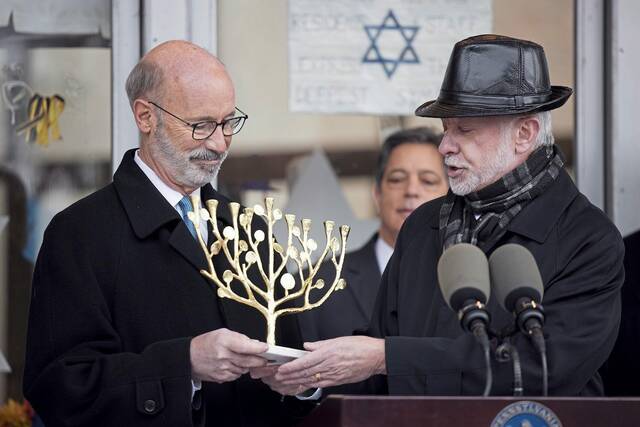Laurel: To new light in a dark corner. On the last day of Hanukkah, the Tree of Life received a special gift.
After three years of the synagogue property sitting empty after the October 2018 shooting that claimed the lives of 11 worshippers from the three congregations that called the house of worship home, a meaningful step to the future happened with a $6.6 million grant from the state.
The money will come from the $54.5 million Redevelopment Assistance Capital Program. Tree of Life is one of 16 projects statewide to receive funding.
“Today, the Tree of Life community is working to turn this space into a welcoming place of reflection and education and, most of all, of healing,” Gov. Tom Wolf said.
The new space will include a memorial to the victims as well as room for worship, education, exhibition and programming space for the Holocaust Center of Pittsburgh.
Lance: To no more pumpkins and the end of an era.
Hill Schramm deserves to retire. He’s 65, and he’s earned it. He’s worked at his family farm since he was 10 and has spent 40 years at the market his parents started on Blank Road.
But it’s still a sad goodbye for the community in and around Harrison City, where Schramm Farms & Orchards, with its pumpkin patch, market and fresh cider, has been a staple, particularly in the fall.
“I’ve been working 8½ days a week,” he said, confirming the closing at the end of the month.
Schramm is the third generation of his family to run the business, but the fourth generation isn’t drawn to the same line of work, so when he steps down, the doors will close.
No decision has been made about the future of the land or the market, although Grandma’s Country Oven Bake Shoppe will continue to operate separately. But the farm-fresh produce will be sorely missed.
Laurel: To a penny saved. Actually, to about three million pennies saved. Tarentum isn’t going to just toss out the old and buy new to replace its dimming street lights. Instead, the borough is working to fix them.
The lights already are energy-saving LEDs, but when those fail, it costs about $1,200 to replace them.
Instead of doing that, the municipality is paying just about $100 to rebuild the fittings and fix the lights in-house. With about 28 lights to replace, the total comes close to $30,000 in savings.
This doesn’t just seem cost effective. It also sounds like a way to prioritize safety, as replacing a light might be delayed because of the cost but fixing it for just a small fraction should keep the streets well lit.








